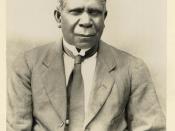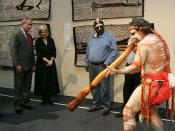Aboriginal people in Australia fared better in 1945 than they di in 1900, due to policies of assimilation rather than protectionism. Although life for Aborigines was still far from their free spirited existence pre colonisation; gradual changes in the way they were treated meant life was somewhat better in 1945, but still faced racism and . In a post colonial society, the Aboriginal people were marginalised and oppressed by the paternalistic policies forming the Aboriginal Act, amended 1905. This act restricted aspects of everyday life, such as not being allowed to camp in or near town, buy alcohol, and be seen as guilty until proven innocent. Chief Protector Neville was also a key factor in Aboriginal disempowerment and further erosion of the Aboriginal culture. Although Aborigines suffered many injustices during this time period, it would appear that life had improved overall by 1945. The experiences of Australia's Aborigines have shaped the nation, making us more accepting of different cultures and the racism and prejudice that was once prevalent in society has decreased.
There was little for Aborigines to celebrate when Australia federated in January 1901. They were excluded in the March 1901 census, which recorded 3,773,801 non Indigenous people living in Australia, and faced government and community racism. The population of Aboriginal people had fallen from 300,000 when whites first settled in 1788 to just 60,000. The Australian constitution made only two references to Aborigines, Sections 51 and 127, which were both aimed at excluding them from the new nation. In 1902, Parliament debated the Commonwealth Franchise Act, and the vote was given to women but not to Aboriginal people. This was because many people felt that to grant franchise to Aborigines is to confer a short-lived privelage on a dying race. This idea stemmed from the social Darwinist...


